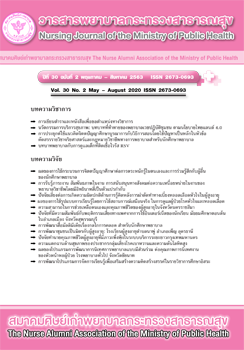Risk Factors for Postoperative Cognitive Dysfunction after Coronary Artery Bypass Grafting in Older Adults
Main Article Content
Abstract
The purpose of this research was to investigate risk factors of comorbidity, inflammatory response, postoperative pain, and postoperative delirium for postoperative cognitive dysfunction (POCD) in older adults undergoing coronary artery bypass grafting. The sample consisted of 120 older adults who had coronary artery bypass grafting. Data were collected by using the Mini-Mental State Examination (MMSE-Thai 2000), the Charlson Comorbidity Index (CCI), the Systemic Inflammatory Response Syndrome (SIRS) scale, the Postoperative Pain scale and the Thai version of the Confusion Assessment Method (CAM). Data analysis was done using chi-square and logistic regression. The results revealed that 49.20 percent of the sparticipants had postoperative cognitive dysfunction. Logistic regression analysis showed that inflammatory response, postoperative pain, and postoperative delirium together predicted with 35.7 percent of the variation in postoperative cognitive dysfunction (Nagelkerke: R2=.357, p<.05) but comorbidity was not significant for predicting postoperative cognitive dysfunction. Therefore, the factors associated with postoperative cognitive dysfunction should be further studied. However, these research findings can be developed for surveillance and care plans so as to prevent the incidence of postoperative cognitive dysfunction.
Article Details
บทความและรายงานวิจัยในวารสารพยาบาลกระทรวงสาธารณสุข เป็นความคิดเห็นของ ผู้เขียน มิใช่ของคณะผู้จัดทำ และมิใช่ความรับผิดชอบของสมาคมศิษย์เก่าพยาบาลกระทรวงสาธารณสุข ซึ่งสามารถนำไปอ้างอิงได้
References
Available from: http://www.dop.go.th/download/knowledge/th1573033396-261_0.pdf
2. Bannister C., Kendall S: Side effects and complications heart surgery. [internet]. 2018 [cited 2020 March 7]. Available from: https://www.ctsnet.org/sites/default/files/images/Side-effects.pdf
3. Rasmussen LS. Postoperative cognitive dysfunction: incidence and prevention. Best Pract Res Clin Anaesthesiol 2006;20(2):315-30.
4. Xu T, Bo L, Wang J, Zhao Z, Xu Z, Deng X, Zhu W. Risk factors for early postoperative cognitive dysfunction after non-coronary bypass surgery in Chinese population. J Cardiothorac Surg 2013;8:2-6.
5. Naknonehun P, Wirojrattana V, Leelahakul V, Kitiyarak C. Risk factors for postoperative cognitive dysfunction after cardiac surgery in older adults. The Journal of Nursing Science 2016;34(1):156-66. (in Thai)
6. Naknonehun P. Postoperative cognitive dysfunction in older adults: knowledge and nursing care based on empirical evidence. Journal Thailand Nursing and Midwifery Council 2018;33(1):15-26. (in Thai).
7. Hood R, Budd A, Sorond FA, Hogue CW. Peri-operative neurological complications. Anaesthesia 2018;73 (Suppl 1):67-75. doi:10.1111/anae.14142.
8. Rundshagen I. Postoperative cognitive dysfunction. Dtsch Arztebl Int 2014;111(8):119-25. doi:10.3238/arztebl.2014.0119.
9. Feinkohl I, Winterer G, Pischon T. Diabetes is associated with risk of postoperative cognitive dysfunction: a meta-analysis. Diabetes Metab Res Rev 2017;33(5):article e2884 doi:10.1002/dmrr.2884.
10. Feinkohl I, Winterer G, Pischon T. Hypertension and risk of post-operative cognitive dysfunction (POCD): a systematic review and meta-analysis. Clin Pract Epidemiol Ment Health 2017;13:27–42. doi:10.2 174/1745017901713010027.
11. Pappa M, Theodosiadis N, Tsounis A, Sarafis P. Pathogenesis and treatment of post-operative cognitive dysfunction. Electron Physician 2017;9(2):3768–75. doi:10.19082/3768.
12. Hudetz JA, Gandhi SD, Iqbal Z, Patterson KM, Pagel PS. Elevated postoperative inflammatory biomarkers are associated with short-and medium-term cognitive dysfunction after coronary artery surgery. J Anesth 2011;25(1):1-9. doi:10.1007/s00540-010-1042-y.
13. Ball IM, Bagshaw SM, Burns KEA. et al. Outcomes of elderly critically ill medical and surgical patients: a multicentre cohort study. Can J Anaesth. 2017;64(3):260-269. doi: 10.1007/s12630-016-0798-4.
14. Srisatidnarakul B. The methodology in nursing research. 5th ed. Bangkok: U&I media; 2010. (in Thai)
15. Charlson M, Pompei P, Ales K, MacKenzie C. A new method of classifying prognostic comorbidity in longitudinal studies: development and validation.J Chronic Dis. 1987;40(5):373–83. doi:10.1016/0021-9681(87)90171-8
16. Bone RC, Balk RA, Cerra FB, Dellinger RP, Fein AM, Knaus WA, et al. Definitions for sepsis and organ failure and guidelines for the use of innovative therapies in sepsis. The ACCP/SCCM Consensus Conference Committee. American College of Chest Physicians/Society of Critical Care Medicine. Chest 1992;101(6):1644-55
17. Wongpakaran N, Wongpakaran T, Bookamana P. et al. Diagnosing delirium in elderly Thai patients: utilization of the CAM algorithm. BMC Fam Pract 2011;12(1):65. doi:https://doi.org/10.1186/1471-2296-12-65
18. Glumac S, Kardum G, Karanovic N. Postoperative cognitive decline after cardiac surgery: a narrative review of current knowledge in 2019. Med Sci Monit 2019;25:3262–70. doi:10.12659/MSM.914435.
19. Ge Y, Ma Z, Shi H, Zhao Y, Gu X, Wei H. Incidence and risk factors of postoperative cognitive dysfunction in patients underwent coronary artery bypass grafting surgery. J Cent South Univ (Med Sci) 2014;39 (10):1049-55. doi:10.11817/j.issn.1672-7347.2014.10.011.
20. Needham MJ, Webb CE, Bryden DC. Postoperative cognitive dysfunction and dementia: what we need to know and do. Br J Anaesth 2017;119(suppl )115–25. doi:10.1093/bja/aex354.
21. Krenk L, Rasmussen LS, Kehlet H. New insights into the pathophysiology of postoperative cognitive dysfunction. Acta Anaesthesiol Scand 2010;54(8):951-6. doi: 10.1111/j.1399-6576.2010.02268.
22. Krenk L, Rasmussen LS. Postoperative delirium and postoperative cognitive dysfunction in elderly-are the differences?. Minerva Anestesiol 2011;77(7):742-9.
23. Daiello LA, Racine AM, Yun Gou R, Marcantonio ER, Xie Z, Kunze LJ, et al. Postoperative delirium and postoperative cognitive dysfunction: overlap and divergence. Anesthesiology 2019;131(3):477-91. doi: https://doi.org/10.1097/ALN.0000000000002729.
24. Ganna A, Roland K, Georg W, Reinhard S. Biomarkers of postoperative delirium and cognitive dysfunction. Frontiers in Aging Neuroscience 2015;7(117):1-16. doi:org/10.3389/fnagi.2015.00112.
25. Kotekar N, Kuruvilla CS, Murthy V. Post-operative cognitive dysfunction in the elderly: a prospective clinical study. Indian J Anaesth 2014;58(3):263-8. doi:10.4103/0019-5049.135034.
26. Iamrod N, Sindhu S, Danaidutsadeekul S, Tantiwongkosri, K. Predictors of delirium in the elderly patients undergone open heart surgery in the first 72 hours after surgery. JRTAN 2016;17(2):34-42. (in Thai)

